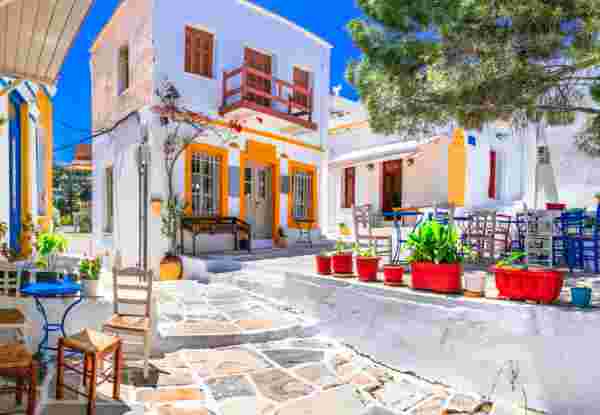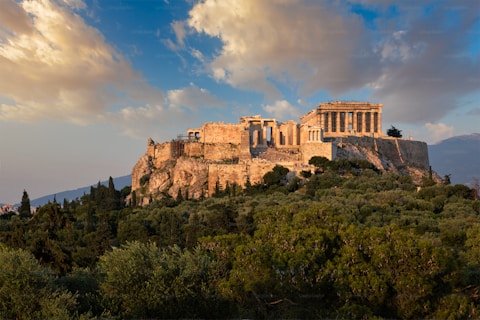Exploring the Meaning of “Kalimera” and “Kalispera” in Greek

The Greek language has a long history. It has many phrases that show how kind and welcoming its people are. Greek communication is not just about its rules; it’s also about how the day goes. This article will explain “Kalimera” and “Kalispera.” These two greetings reflect the mood of Greek hello’s by noting the time of day.
Greetings in the Greek Language
In the world of languages, greetings are like ties that link people from different cultures. They show respect, acknowledge someone’s presence, and create a friendly feel for talks. In Greek, greetings matter a lot. They reflect how we value time during the day. Two key greetings are “Kalimera” for good morning and “Kalispera” for good evening. These words connect language to the changing times of day.
What is the difference between “Kalimera” and “Kalispera”?
“Kalimera” means “good morning.” It is a cheerful way to greet people from morning until noon. You can use this greeting in different situations. For instance, feel free to say it when you talk to locals at the bakery or during a formal business meeting. When the sun begins to set, “Kalispera” is a good greeting. It means “good evening.” You can say it from late afternoon and later. If you are having dinner with friends or passing a neighbor at night, “Kalispera” is a nice way to recognize the evening. “Kalimera” and “Kalispera” mean different things. They reflect a deep respect for the time of day. This is an important part of Greek culture.
Greeks usually respond to “Kalimera” with “Kalimera,” especially in the morning. For “Kalispera,” which is used in the evening, they often reply with “Kalispera” too.
Greeks often answer “Kalimera” by saying “Kalimera” back with a big smile. They feel happy when visitors try to speak their language. You can see their joy in how they reply. “Kalispera” is answered with “Kalispera” and a smile. Greek greetings are lovely because they are straightforward and genuine. They help create a fast bond between people. If your pronunciation is not perfect, that’s okay. Just by using these Greek greetings, you will receive gratitude and respect.
Can “Kalimera” be Used at any Time of the Day?
“Kalimera” is a hello you use mostly in the morning. You can say it until noon. Think of “Kalimera” as a greeting for the first part of the day. In some areas of Greece, especially in the countryside, people may say “Kalimera” even in the afternoon. This shows how language can change and how different cultures exist in Greece. To get it right, pay attention to the second part. Say it like this: “kah-lee-MEH-rah.” With practice, you will greet locals like a real Greek!
Avoid Using These Greetings in These Situations
While “Kalimera” and “Kalispera” are common greetings, sometimes you should use different words. For instance, when you pick up the phone, Greeks usually say “Ne” (yes) or “Parakalo” (please) instead of “Kalimera” or “Kalispera.” When talking to someone older or in charge, it’s best to say “Yassas” to greet them. Understanding this shows it is important to respect culture when you talk in different situations. When you watch how local people greet each other, you will understand when to use “Kalimera,” “Kalispera,” and other greetings correctly.
Want More Insider Tips on Greece?
More Greek Greetings
The Greek language has more greetings besides “Kalimera” and “Kalispera.” Learning these can help you grow your vocabulary. It can also help you connect with people in the area. If you want to say “good afternoon,” you can use “Kalo Mesimeri.” When the day is over, feel free to say “Kalinychta” to wish someone a “good night.”
Here are some more greetings you can use:
- Yassas: This is a friendly hello for any time of day, formal or not.
- Ya: This is a shorter and friendly way to say “Yassas.” People often use it with friends and family.
- Ti kaneis? This means “how are you?” It is a nice way to ask how someone is feeling.
These words can make it more fun for you to use the Greek language!
When to Say “Kalimera” and “Kalispera”
Timing is very important when you use “Kalimera” and “Kalispera.” You should say “Kalimera” mainly in the morning. This hello is good from sunrise to noon. “Kalispera” is the correct greeting to use in the late afternoon. It works well as the sun sets and evening arrives.
“Kalimera”: More Than Just Good Morning
While “Kalimera” means “good morning,” it is more than a simple hello. It gives a sense of newness and hope as the day starts. When a local says “Kalimera” to you, they are wishing you a good and happy day. Using “Kalimera” can help start more talks and make new connections. These talks might be about the weather, your plans for the day, or friendly news about what’s happening nearby. “Kalimera” helps start a nice and friendly chat. It reflects the warm and welcoming feel of Greek culture.
“Kalispera”: Welcoming the Evening
As day turns into night, people in Greece often say “Kalispera.” This greeting is more than just hello. “Kalispera” means the day is ending. It shows that people are ready to come together, relax, and have fun. When you meet friends for dinner, chat with neighbors after work, or go for a walk in the evening, saying “Kalispera” is a nice way to greet others as the night starts. Using “Kalispera” correctly shows that you respect the culture. It helps you feel closer to the local people. A small effort in learning their greetings can really help you in Greece!
Useful Greek words and Phrases
Learning some simple Greek phrases can greatly elevates your travel experiences. It helps you feel more connected to the local culture. Greeks appreciate it when guests make an effort to speak their language, even if it’s just a few basic words. Using a few Greek words can make ordering food or asking for directions easier. It will also bring smiles and help you along the way.
If you Need Assistance
Knowing a few basic Greek words can really help. This is especially true when you need assistance. Words like “Parakalo” (please) and “Efharisto” (thank you) reflect good manners and appreciation. If you feel lost, start by politely getting someone’s attention with “Signomi” (excuse me). After that, you can ask, “Pou einai…” (where is) and say the name of the place you want to go. Don’t worry if you don’t pronounce things well. People will see that you are trying. They will answer kindly because of their well-known Greek kindness.
When Shopping or at Restaurants
Using the local language while shopping or eating is a great way to improve your interactions and show respect for Greek culture. Simple phrases like “Poso kani afto?” (How much is this?) and “Tha ithela…” (I would like…) can be very useful. When you order at a restaurant, start with “Kalimera” in the morning or “Kalispera” in the evening. Next, use “Parakalo” for requests and say “Efharisto” to show thanks.
Here’s a helpful table with some key phrases:
| English | Greek |
| Hello | Yassas |
| Thank you | Efharisto |
| Please | Parakalo |
| Excuse me | Signomi |
| How much is this? | Poso kani afto? |
| I would like… | Tha ithela… |
| The bill, please | To logariasmo, parakalo |
For Allergies and Health
Knowing how to discuss allergies or health issues is important, especially when you are traveling abroad. Many Greeks in tourist spots can speak English. However, it is helpful to know a few phrases in Greek for times when you do not understand. If you have allergies, you should know how to say “Eimai alergikos/i se…” (I am allergic to…) and then say what you are allergic to. If you want to know if a dish has a certain ingredient, you can ask, “Exei mesa…?” (Does this have…?).
In a medical emergency, call 112 for help immediately.
For Emergencies
While we hope you do not have an emergency while you travel, it is wise to be prepared. In Greece, you can call 112 for any emergency. This number will connect you with police, fire services, or medical help, based on what you need. If you don’t speak Greek very well, try to stay calm. Clearly tell them where you are and what the problem is. It can help to learn a few basic Greek words. For example, “voitheia” means “help.” Talking clearly is important, especially in tough situations. It could help to know simple emergency phrases.
Asking for Directions
One of the best ways to explore a new city is by getting lost in its streets. If you need help, knowing how to ask for directions in Greek can help. Start by saying “Signomi” (excuse me) to get someone’s attention. Then, ask “Pou einai…” (where is…) and say where you want to go. Having a map or a picture of your destination can help you a lot. It makes communication easier, even if your language skills are not great. Here’s a fun fact. The Greek word for “street” is “dromos.” This word links to the English word “aerodrome.” It shows how much the old language still impacts us today!
Do Greeks Speak English?
Greek is the main language, but if you’re wondering if Greeks speak English, the answer in a nutshell is yes. This is especially true in tourist areas and large cities. However, feel free to use your Greek phrases! Greeks like it when visitors try to speak their language. Saying “Kalimera,” which means good morning, shows respect for their culture. This simple act can make a big difference. When you attempt to speak Greek, you will often see warm smiles and get helpful assistance from the locals.
Conclusion
Knowing how to use greetings like “Kalimera” and “Kalispera” in Greek shows that you respect the culture. These phrases help start nice conversations based on the time of day. Using these greetings can make your talks with Greek speakers better. Also, knowing a few basic Greek phrases can help how you talk in different situations. The next time you say hello in Greek, think about the warmth and kindness that these words offer. This will help you feel closer to the culture when you plan your trip to Greece.
Feeling Ready?
From our blog

Visiting Athens with Kids: A helpful Guide
READ MORE
Paros for Seniors: Tips and Itinerary
READ MORE
Best Resorts in Greece for Families: Your Ultimate 2025 Guide
READ MORE
How to Enjoy Santorini for Seniors
READ MORE
Honeymoon in Paros Island
READ MORE
Rome Travel Guide: What to Do, When to go and Where to Go
READ MORE
The Best Greek Islands for Couples, According to a Luxury DMC
READ MORE
Discover Milan: Top Attractions
READ MORE
Athens in February Travel Guide
READ MORE



